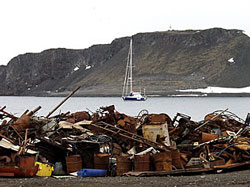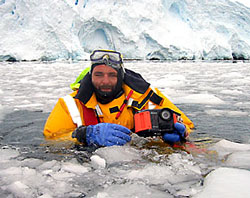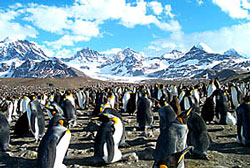Mission Antarctica set up by Robert Swan after walking to both South & North Pole. Antarctica is a truly unique place, but not as white and pristine as you would first imagine, and Robert was amazed at the rubbish problem.
Antarctica is not owned by anyone, however 44 signatory countries administer the continent. The treaty was set up so that it could be looked after for the future and states that everything brought in to the continent must be taken out, but obviously this was not happening.
 In 1992 Robert was the keynote speaker at the
first Earth Summit in Rio and spoke about the rubbish
problem in Antarctica. With their approval he then set up a
project to do something about it, choosing the Russian Base
of Bellingshausen, as it was one of the worse areas. Also,
it was accessible to visiting ships and had a runway
nearby, allowing both easy access for research into the
removal and aiding the difficult logistics.
In 1992 Robert was the keynote speaker at the
first Earth Summit in Rio and spoke about the rubbish
problem in Antarctica. With their approval he then set up a
project to do something about it, choosing the Russian Base
of Bellingshausen, as it was one of the worse areas. Also,
it was accessible to visiting ships and had a runway
nearby, allowing both easy access for research into the
removal and aiding the difficult logistics.
For a number of years a team of Russian volunteers cut, compacted and moved the scrap onto the beach, stockpiling it to ease the removal later.
During December & January 2001/2002 the Ship “Anne Boye” was chartered and sailed to King George island to remove the scrap. A small team of 5 from the UK, together with the Russian volunteers then managed to move 1,000 tons of scrap from the beach onto the ship, all within 3 weeks.
The site was then levelled by JCB and within that week, the penguins and seals were back on the beach, oblivious to its former history. The waste was then taken to Uruguay for recycling, with the Dangerous waste like Asbestos, fuels and oils, taken to the UK for specialist disposal.
The Yacht “2041” (so named as this is the renewal date of the Antarctic Treaty) played an important role in the operation, as the main aim of the project was worldwide education.
For the first time ever, crew would be flown into the
Antarctic to join the yacht for 8-10 day voyages,
experiencing firsthand the cleanup, together with the
awesome beauty in areas, as yet, untouched or visited by
man.
Young people and teachers from 19 different countries sailed onboard Voyages 1 and 2. The aim was to get young people interested now, in preserving Antarctica, which would mean that in their later years when they were working and in possible leadership roles, they would remember this and take positive action to look after the Continent.
Voyage 3 allowed Robert, together with the sponsors, to observe firsthand the cleanup in operation. Voyage 4 was especially for young underprivileged South Africans. They had never even seen the sea before, let alone ice, when they visited the Continent. The final voyage sailed much deeper into the southern peninsular regions, observing how other bases are dealing with their waste. New territories were explored, before returning to S. America ahead of the winter, now closing in. The yacht had now sailed over 4,000M during our 3-Month Antarctic Expedition.
After resupplying in Argentina, the yacht sailed 1,400M to South Georgia, for a two week Expedition to see how the wildlife was coping with the waste left in the numerous abandoned Whaling Stations.
From the near extinction of the seals during the whaling era, they have made a spectacular recovery, and now they rule the very stations that nearly pushed them to the brink of extinction on South Georgia. There are now estimated to be over 1.5 million Fur seals resident on the Island, as well as thousands of Elephant Seals.
 South Georgia is truly one of the world’s
most spectacular wildlife habitats. This is mostly due to
its desolation and the fact that man finds it so very hard
to reach it – even in this day and age.
South Georgia is truly one of the world’s
most spectacular wildlife habitats. This is mostly due to
its desolation and the fact that man finds it so very hard
to reach it – even in this day and age.
King penguins gather to breed in massive numbers, due to its year round access to the sea. On this beach alone there were estimated to be over Half a Million penguins!
On arrival in Cape Town, after a round trip of over 12,000M, the yacht was lifted out the water to be transported overland to Johannesburg, for The World Summit on Sustainable Development, where Robert addressed the United Nations on the success of the project in Antarctica. The yacht become a “floating petition” containing the names of thousands of young people who have pledged their support to the project on preserving & managing Antarctica
During all the Expeditions the crew filmed 25 hours of DV footage, using high quality digital video, together with over 5,000 digital images and 5,000 film images on Transparency. The images were complied, using the onboard video edit suite, onto CD’s for the Participants, to take back to their respective countries to show how the project had succeeded in the waste removal.
Andrew Dare is now conducting multimedia presentations, which explains the whole project from it start in Africa, the cleanup in Antarctica & the return to Africa, via South Georgia.
If you would like further details of this amazing expedition and project or to obtain images, please contact the Yacht Captain, Andrew Dare, e-mail: andydare@bigfoot.com
